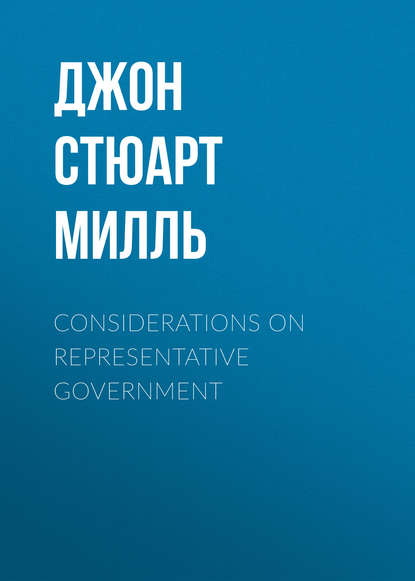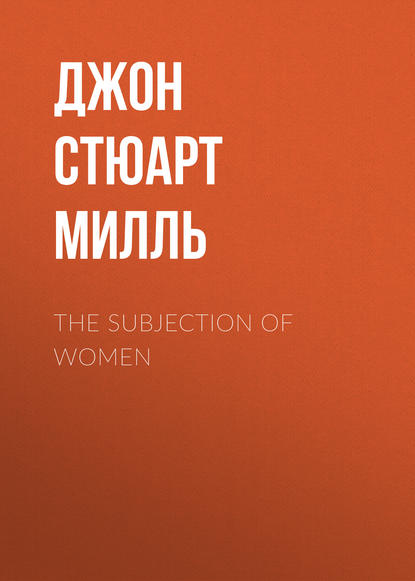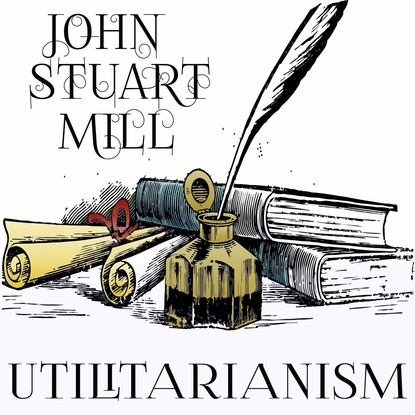 Полная версия
Полная версияПолная версия:
Джон Стюарт Милль On Liberty
- + Увеличить шрифт
- - Уменьшить шрифт

John Stuart Mill
On Liberty
To the beloved and deplored memory of her who was the inspirer, and in part the author, of all that is best in my writings – the friend and wife whose exalted sense of truth and right was my strongest incitement, and whose approbation was my chief reward – I dedicate this volume. Like all that I have written for many years, it belongs as much to her as to me; but the work as it stands has had, in a very insufficient degree, the inestimable advantage of her revision; some of the most important portions having been reserved for a more careful re-examination, which they are now never destined to receive. Were I but capable of interpreting to the world one-half the great thoughts and noble feelings which are buried in her grave, I should be the medium of a greater benefit to it than is ever likely to arise from anything that I can write, unprompted and unassisted by her all but unrivalled wisdom.
INTRODUCTION.
I
John Stuart Mill was born on 20th May 1806. He was a delicate child, and the extraordinary education designed by his father was not calculated to develop and improve his physical powers. "I never was a boy," he says; "never played cricket." His exercise was taken in the form of walks with his father, during which the elder Mill lectured his son and examined him on his work. It is idle to speculate on the possible results of a different treatment. Mill remained delicate throughout his life, but was endowed with that intense mental energy which is so often combined with physical weakness. His youth was sacrificed to an idea; he was designed by his father to carry on his work; the individuality of the boy was unimportant. A visit to the south of France at the age of fourteen, in company with the family of General Sir Samuel Bentham, was not without its influence. It was a glimpse of another atmosphere, though the studious habits of his home life were maintained. Moreover, he derived from it his interest in foreign politics, which remained one of his characteristics to the end of his life. In 1823 he was appointed junior clerk in the Examiners' Office at the India House.
Mill's first essays were written in the Traveller about a year before he entered the India House. From that time forward his literary work was uninterrupted save by attacks of illness. His industry was stupendous. He wrote articles on an infinite variety of subjects, political, metaphysical, philosophic, religious, poetical. He discovered Tennyson for his generation, he influenced the writing of Carlyle's French Revolution as well as its success. And all the while he was engaged in studying and preparing for his more ambitious works, while he rose step by step at the India Office. His Essays on Unsettled Questions in Political Economy were written in 1831, although they did not appear until thirteen years later. His System of Logic, the design of which was even then fashioning itself in his brain, took thirteen years to complete, and was actually published before the Political Economy. In 1844 appeared the article on Michelet, which its author anticipated would cause some discussion, but which did not create the sensation he expected. Next year there were the "Claims of Labour" and "Guizot," and in 1847 his articles on Irish affairs in the Morning Chronicle. These years were very much influenced by his friendship and correspondence with Comte, a curious comradeship between men of such different temperament. In 1848 Mill published his Political Economy, to which he had given his serious study since the completion of his Logic. His articles and reviews, though they involved a good deal of work – as, for instance, the re-perusal of the Iliad and the Odyssey in the original before reviewing Grote's Greece– were recreation to the student. The year 1856 saw him head of the Examiners' Office in the India House, and another two years brought the end of his official work, owing to the transfer of India to the Crown. In the same year his wife died. Liberty was published shortly after, as well as the Thoughts on Parliamentary Reform, and no year passed without Mill making important contributions on the political, philosophical, and ethical questions of the day.
Seven years after the death of his wife, Mill was invited to contest Westminster. His feeling on the conduct of elections made him refuse to take any personal action in the matter, and he gave the frankest expression to his political views, but nevertheless he was elected by a large majority. He was not a conventional success in the House; as a speaker he lacked magnetism. But his influence was widely felt. "For the sake of the House of Commons at large," said Mr. Gladstone, "I rejoiced in his advent and deplored his disappearance. He did us all good." After only three years in Parliament, he was defeated at the next General Election by Mr. W. H. Smith. He retired to Avignon, to the pleasant little house where the happiest years of his life had been spent in the companionship of his wife, and continued his disinterested labours. He completed his edition of his father's Analysis of the Mind, and also produced, in addition to less important work, The Subjection of Women, in which he had the active co-operation of his step-daughter. A book on Socialism was under consideration, but, like an earlier study of Sociology, it never was written. He died in 1873, his last years being spent peacefully in the pleasant society of his step-daughter, from whose tender care and earnest intellectual sympathy he caught maybe a far-off reflection of the light which had irradiated his spiritual life.
II
The circumstances under which John Stuart Mill wrote his Liberty are largely connected with the influence which Mrs. Taylor wielded over his career. The dedication is well known. It contains the most extraordinary panegyric on a woman that any philosopher has ever penned. "Were I but capable of interpreting to the world one-half the great thoughts and noble feelings which are buried in her grave, I should be the medium of a greater benefit to it than is ever likely to arise from anything that I can write, unprompted and unassisted by her all but unrivalled wisdom." It is easy for the ordinary worldly cynicism to curl a sceptical lip over sentences like these. There may be exaggeration of sentiment, the necessary and inevitable reaction of a man who was trained according to the "dry light" of so unimpressionable a man as James Mill, the father; but the passage quoted is not the only one in which John Stuart Mill proclaims his unhesitating belief in the intellectual influence of his wife. The treatise on Liberty was written especially under her authority and encouragement, but there are many earlier references to the power which she exercised over his mind. Mill was introduced to her as early as 1831, at a dinner-party at Mr. Taylor's house, where were present, amongst others, Roebuck, W. J. Fox, and Miss Harriet Martineau. The acquaintance rapidly ripened into intimacy and the intimacy into friendship, and Mill was never weary of expatiating on all the advantages of so singular a relationship. In some of the presentation copies of his work on Political Economy, he wrote the following dedication: – "To Mrs. John Taylor, who, of all persons known to the author, is the most highly qualified either to originate or to appreciate speculation on social advancement, this work is with the highest respect and esteem dedicated." An article on the enfranchisement of women was made the occasion for another encomium. We shall hardly be wrong in attributing a much later book, The Subjection of Women, published in 1869, to the influence wielded by Mrs. Taylor. Finally, the pages of the Autobiography ring with the dithyrambic praise of his "almost infallible counsellor."
The facts of this remarkable intimacy can easily be stated. The deductions are more difficult. There is no question that Mill's infatuation was the cause of considerable trouble to his acquaintances and friends. His father openly taxed him with being in love with another man's wife. Roebuck, Mrs. Grote, Mrs. Austin, Miss Harriet Martineau were amongst those who suffered because they made some allusion to a forbidden subject. Mrs. Taylor lived with her daughter in a lodging in the country; but in 1851 her husband died, and then Mill made her his wife. Opinions were widely divergent as to her merits; but every one agreed that up to the time of her death, in 1858, Mill was wholly lost to his friends. George Mill, one of Mill's younger brothers, gave it as his opinion that she was a clever and remarkable woman, but "nothing like what John took her to be." Carlyle, in his reminiscences, described her with ambiguous epithets. She was "vivid," "iridescent," "pale and passionate and sad-looking, a living-romance heroine of the royalist volition and questionable destiny." It is not possible to make much of a judgment like this, but we get on more certain ground when we discover that Mrs. Carlyle said on one occasion that "she is thought to be dangerous," and that Carlyle added that she was worse than dangerous, she was patronising. The occasion when Mill and his wife were brought into close contact with the Carlyles is well known. The manuscript of the first volume of the French Revolution had been lent to Mill, and was accidentally burnt by Mrs. Mill's servant. Mill and his wife drove up to Carlyle's door, the wife speechless, the husband so full of conversation that he detained Carlyle with desperate attempts at loquacity for two hours. But Dr. Garnett tells us, in his Life of Carlyle, that Mill made a substantial reparation for the calamity for which he was responsible by inducing the aggrieved author to accept half of the £200 which he offered. Mrs. Mill, as I have said, died in 1858, after seven years of happy companionship with her husband, and was buried at Avignon. The inscription which Mill wrote for her grave is too characteristic to be omitted: – "Her great and loving heart, her noble soul, her clear, powerful, original, and comprehensive intellect, made her the guide and support, the instructor in wisdom and the example in goodness, as she was the sole earthly delight of those who had the happiness to belong to her. As earnest for all public good as she was generous and devoted to all who surrounded her, her influence has been felt in many of the greatest improvements of the age, and will be in those still to come. Were there even a few hearts and intellects like hers, this earth would already become the hoped-for Heaven." These lines prove the intensity of Mill's feeling, which is not afraid of abundant verbiage; but they also prove that he could not imagine what the effect would be on others, and, as Grote said, only Mill's reputation could survive these and similar displays.
Every one will judge for himself of this romantic episode in Mill's career, according to such experience as he may possess of the philosophic mind and of the value of these curious but not infrequent relationships. It may have been a piece of infatuation, or, if we prefer to say so, it may have been the most gracious and the most human page in Mill's career. Mrs. Mill may have flattered her husband's vanity by echoing his opinions, or she may have indeed been an Egeria, full of inspiration and intellectual helpfulness. What usually happens in these cases, – although the philosopher himself, through his belief in the equality of the sexes, was debarred from thinking so, – is the extremely valuable action and reaction of two different classes and orders of mind. To any one whose thoughts have been occupied with the sphere of abstract speculation, the lively and vivid presentment of concrete fact comes as a delightful and agreeable shock. The instinct of the woman often enables her not only to apprehend but to illustrate a truth for which she would be totally unable to give the adequate philosophic reasoning. On the other hand, the man, with the more careful logical methods and the slow processes of formal reasoning, is apt to suppose that the happy intuition which leaps to the conclusion is really based on the intellectual processes of which he is conscious in his own case. Thus both parties to the happy contract are equally pleased. The abstract truth gets the concrete illustration; the concrete illustration finds its proper foundation in a series of abstract inquiries. Perhaps Carlyle's epithets of "iridescent" and "vivid" refer incidentally to Mrs. Mill's quick perceptiveness, and thus throw a useful light on the mutual advantages of the common work of husband and wife. But it savours almost of impertinence even to attempt to lift the veil on a mystery like this. It is enough to say, perhaps, that however much we may deplore the exaggeration of Mill's references to his wife, we recognise that, for whatever reason, the pair lived an ideally happy life.
It still, however, remains to estimate the extent to which Mrs. Taylor, both before and after her marriage with Mill, made actual contributions to his thoughts and his public work. Here I may be perhaps permitted to avail myself of what I have already written in a previous work.1 Mill gives us abundant help in this matter in the Autobiography. When first he knew her, his thoughts were turning to the subject of Logic. But his published work on the subject owed nothing to her, he tells us, in its doctrines. It was Mill's custom to write the whole of a book so as to get his general scheme complete, and then laboriously to re-write it in order to perfect the phrases and the composition. Doubtless Mrs. Taylor was of considerable help to him as a critic of style. But to be a critic of doctrine she was hardly qualified. Mill has made some clear admissions on this point. "The only actual revolution which has ever taken place in my modes of thinking was already complete,"2 he says, before her influence became paramount. There is a curiously humble estimate of his own powers (to which Dr. Bain has called attention), which reads at first sight as if it contradicted this. "During the greater part of my literary life I have performed the office in relation to her, which, from a rather early period, I had considered as the most useful part that I was qualified to take in the domain of thought, that of an interpreter of original thinkers, and mediator between them and the public." So far it would seem that Mill had sat at the feet of his oracle; but observe the highly remarkable exception which is made in the following sentence: – "For I had always a humble opinion of my own powers as an original thinker, except in abstract science (logic, metaphysics, and the theoretic principles of political economy and politics.)"3 If Mill then was an original thinker in logic, metaphysics, and the science of economy and politics, it is clear that he had not learnt these from her lips. And to most men logic and metaphysics may be safely taken as forming a domain in which originality of thought, if it can be honestly professed, is a sufficient title of distinction.
Mrs. Taylor's assistance in the Political Economy is confined to certain definite points. The purely scientific part was, we are assured, not learnt from her. "But it was chiefly her influence which gave to the book that general tone by which it is distinguished from all previous expositions of political economy that had any pretensions to be scientific, and which has made it so useful in conciliating minds which those previous expositions had repelled. This tone consisted chiefly in making the proper distinction between the laws of the production of wealth, which are real laws of Nature, dependent on the properties of objects, and the modes of its distribution, which, subject to certain conditions, depend on human will… I had indeed partially learnt this view of things from the thoughts awakened in me by the speculations of St. Simonians; but it was made a living principle, pervading and animating the book, by my wife's promptings."4 The part which is italicised is noticeable. Here, as elsewhere, Mill thinks out the matter by himself; the concrete form of the thoughts is suggested or prompted by the wife. Apart from this "general tone," Mill tells us that there was a specific contribution. "The chapter which has had a greater influence on opinion than all the rest, that on the Probable Future of the Labouring Classes, is entirely due to her. In the first draft of the book that chapter did not exist. She pointed out the need of such a chapter, and the extreme imperfection of the book without it; she was the cause of my writing it." From this it would appear that she gave Mill that tendency to Socialism which, while it lends a progressive spirit to his speculations on politics, at the same time does not manifestly accord with his earlier advocacy of peasant proprietorships. Nor, again, is it, on the face of it, consistent with those doctrines of individual liberty which, aided by the intellectual companionship of his wife, he propounded in a later work. The ideal of individual freedom is not the ideal of Socialism, just as that invocation of governmental aid to which the Socialist resorts is not consistent with the theory of laisser-faire. Yet Liberty was planned by Mill and his wife in concert. Perhaps a slight visionariness of speculation was no less the attribute of Mrs. Mill than an absence of rigid logical principles. Be this as it may, she undoubtedly checked the half-recognised leanings of her husband in the direction of Coleridge and Carlyle. Whether this was an instance of her steadying influence,5 or whether it added one more unassimilated element to Mill's diverse intellectual sustenance, may be wisely left an open question. We cannot, however, be wrong in attributing to her the parentage of one book of Mill, The Subjection of Women. It is true that Mill had before learnt that men and women ought to be equal in legal, political, social, and domestic relations. This was a point on which he had already fallen foul of his father's essay on Government. But Mrs. Taylor had actually written on this very point, and the warmth and fervour of Mill's denunciations of women's servitude were unmistakably caught from his wife's view of the practical disabilities entailed by the feminine position.
III
Liberty was published in 1859, when the nineteenth century was half over, but in its general spirit and in some of its special tendencies the little tract belongs rather to the standpoint of the eighteenth century than to that which saw its birth. In many of his speculations John Stuart Mill forms a sort of connecting link between the doctrines of the earlier English empirical school and those which we associate with the name of Mr. Herbert Spencer. In his Logic, for instance, he represents an advance on the theories of Hume, and yet does not see how profoundly the victories of Science modify the conclusions of the earlier thinker. Similarly, in his Political Economy, he desires to improve and to enlarge upon Ricardo, and yet does not advance so far as the modifications of political economy by Sociology, indicated by some later – and especially German – speculations on the subject. In the tract on Liberty, Mill is advocating the rights of the individual as against Society at the very opening of an era that was rapidly coming to the conclusion that the individual had no absolute rights against Society. The eighteenth century view is that individuals existed first, each with their own special claims and responsibilities; that they deliberately formed a Social State, either by a contract or otherwise; and that then finally they limited their own action out of regard for the interests of the social organism thus arbitrarily produced. This is hardly the view of the nineteenth century. It is possible that logically the individual is prior to the State; historically and in the order of Nature, the State is prior to the individual. In other words, such rights as every single personality possesses in a modern world do not belong to him by an original ordinance of Nature, but are slowly acquired in the growth and development of the social state. It is not the truth that individual liberties were forfeited by some deliberate act when men made themselves into a Commonwealth. It is more true to say, as Aristotle said long ago, that man is naturally a political animal, that he lived under strict social laws as a mere item, almost a nonentity, as compared with the Order, Society, or Community to which he belonged, and that such privileges as he subsequently acquired have been obtained in virtue of his growing importance as a member of a growing organisation. But if this is even approximately true, it seriously restricts that liberty of the individual for which Mill pleads. The individual has no chance, because he has no rights, against the social organism. Society can punish him for acts or even opinions which are anti-social in character. His virtue lies in recognising the intimate communion with his fellows. His sphere of activity is bounded by the common interest. Just as it is an absurd and exploded theory that all men are originally equal, so it is an ancient and false doctrine to protest that a man has an individual liberty to live and think as he chooses in any spirit of antagonism to that larger body of which he forms an insignificant part.
Nowadays this view of Society and of its development, which we largely owe to the Philosophie Positive of M. Auguste Comte, is so familiar and possibly so damaging to the individual initiative, that it becomes necessary to advance and proclaim the truth which resides in an opposite theory. All progress, as we are aware, depends on the joint process of integration and differentiation; synthesis, analysis, and then a larger synthesis seem to form the law of development. If it ever comes to pass that Society is tyrannical in its restrictions of the individual, if, as for instance in some forms of Socialism, based on deceptive analogies of Nature's dealings, the type is everything and the individual nothing, it must be confidently urged in answer that the fuller life of the future depends on the manifold activities, even though they may be antagonistic, of the individual. In England, at all events, we know that government in all its different forms, whether as King, or as a caste of nobles, or as an oligarchical plutocracy, or even as trades unions, is so dwarfing in its action that, for the sake of the future, the individual must revolt. Just as our former point of view limited the value of Mill's treatise on Liberty, so these considerations tend to show its eternal importance. The omnipotence of Society means a dead level of uniformity. The claim of the individual to be heard, to say what he likes, to do what he likes, to live as he likes, is absolutely necessary, not only for the variety of elements without which life is poor, but also for the hope of a future age. So long as individual initiative and effort are recognised as a vital element in English history, so long will Mill's Liberty, which he confesses was based on a suggestion derived from Von Humboldt, remain as an indispensable contribution to the speculations, and also to the health and sanity, of the world.
What his wife really was to Mill, we shall, perhaps, never know. But that she was an actual and vivid force, which roused the latent enthusiasm of his nature, we have abundant evidence. And when she died at Avignon, though his friends may have regained an almost estranged companionship, Mill was, personally, the poorer. Into the sorrow of that bereavement we cannot enter: we have no right or power to draw the veil. It is enough to quote the simple words, so eloquent of an unspoken grief – "I can say nothing which could describe, even in the faintest manner, what that loss was and is. But because I know that she would have wished it, I endeavour to make the best of what life I have left, and to work for her purposes with such diminished strength as can be derived from thoughts of her, and communion with her memory."
W. L. COURTNEY.London, July 5th, 1901.
CHAPTER I
INTRODUCTORY





